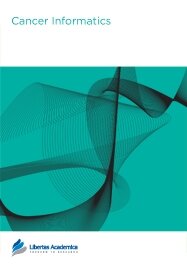

Publication Date: 05 Nov 2014
Type: Review
Journal: Cancer Informatics
Citation: Cancer Informatics 2014:Suppl. 3 71-80
doi: 10.4137/CIN.S14026

A major goal in cancer medicine is to find selective drugs with reduced side effect. A pair of genes is called synthetic lethality (SL) if mutations of both genes will kill a cell while mutation of either gene alone will not. Hence, a gene in SL interactions with a cancer-specific mutated gene will be a promising drug target with anti-cancer selectivity. Wet-lab screening approach is still so costly that even for yeast only a small fraction of gene pairs has been covered. Computational methods are therefore important for large-scale discovery of SL interactions. Most existing approaches focus on individual features or machine-learning methods, which are prone to noise or overfitting. In this paper, we propose an approach named MetaSL for predicting yeast SL, which integrates 17 genomic and proteomic features and the outputs of 10 classification methods. MetaSL thus combines the strengths of existing methods and achieves the highest area under the Receiver Operating Characteristics (ROC) curve (AUC) of 87.1% among all competitors on yeast data. Moreover, through orthologous mapping from yeast to human genes, we then predicted several lists of candidate SL pairs in human cancer. Our method and predictions would thus shed light on mechanisms of SL and lead to discovery of novel anti-cancer drugs. In addition, all the experimental results can be downloaded from http://www.ntu.edu.sg/home/zhengjie/data/MetaSL.
PDF (1.31 MB PDF FORMAT)
RIS citation (ENDNOTE, REFERENCE MANAGER, PROCITE, REFWORKS)
Supplementary Files 1 (55.39 KB ZIP FORMAT)
BibTex citation (BIBDESK, LATEX)
XML
PMC HTML


Compared with other journals we considered for publishing, Cancer Informatics provided extremely rapid but quality turnaround from draft submission to a flawlessly typeset final publication. Moreover, sharing the article is now as easy as sharing a link with no subscriptions required, and additional code and data files are equally accessible, supporting reproducible research. Because it has published many of our references we feel confident that our target readership must follow the journal. This is further ...
Facebook Google+ Twitter
Pinterest Tumblr YouTube